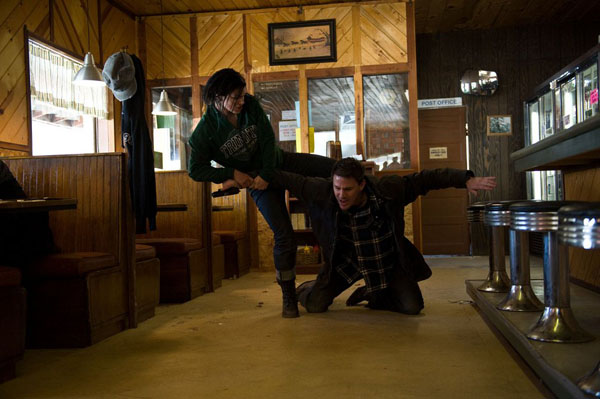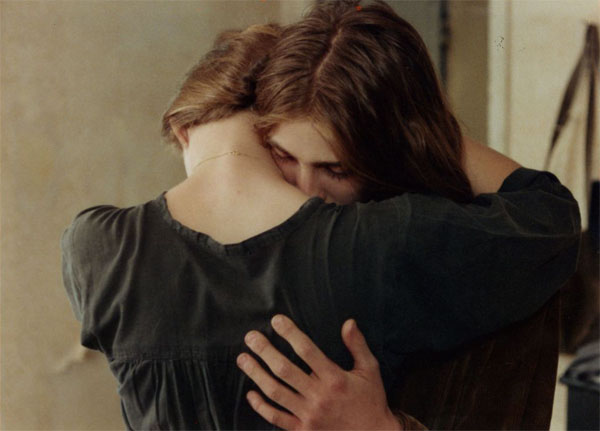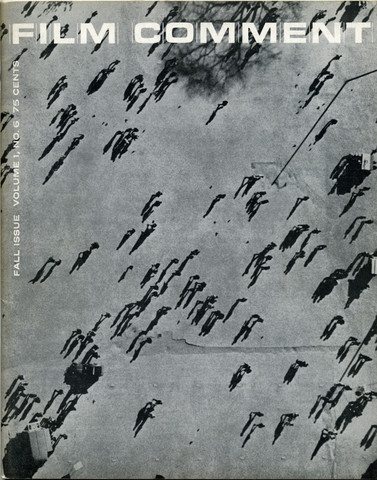Cléo is a new “quarterly digital journal of film and film culture informed by feminist perspectives” founded and edited by Kiva Reardon, whose byline you, an avid reader of Cinema Scope, will be familiar with. In her inaugural editorial, she tells us that the theme of the first issue is “Flesh” in that it “taps into an emerging realm of thought in film theory regarding the body in performance, combined with the contemporary dialogue surrounding women’s bodies in the political sphere. Leos Carax’s Holy Motors (2012) is read [by Mallory Andrews] through a lens of the impact of digital on the theatrical body. Vicky Funari and Julia Query’s Live Nude Girls Unite! (2000), and Frederick Wiseman’s Crazy Horse (2011) are examined [by Calina Ellwand] for their potential to incite political activism with regards to labor rights and re-configuring popular conceptions of exotic dancers. Kathryn Bigelow’s Zero Dark Thirty (2012) is taken on [by Lindsay Jensen] via a discussion of Otherness and the idealized white female form. Steven Soderbergh’s Haywire (2011) is looked at [by Kiva Reardon herself] through a discussion of the active female body. Harmony Korine’s Gummo (1997) and Spring Breakers (2012) are seen [by Julia Cooper] as subverting body politics.”
The new April issue of the Brooklyn Rail features Karen Rester‘s talk with Kamboziya Partovi about collaborating with Jafar Panahi on Pardé (Closed Curtain). It took place in Berlin during the Berlinale in February. Last month, Iranian authorities confiscated his passport as well as that of actress Maryam Moghadam, who appears in the film.
Also in the new BR: Joshua Sperling talks with Olivier Assayas, who tells him that “the 1970s are scary. It was a time, unlike today, when people put their ideas into practice—pretty much put their lives on the line…. Bresson, to me, is the one filmmaker who really captured the 1970s. The Devil, Probably is possibly the greatest film about the decade; it kind of sums it all up.” Plus, Jason LaRivière on Harmony Korine’s Spring Breakers and Genevieve Yue‘s interview with Sandra Gibson and Luis Recoder, whose Topsy-Turvy is “a cylindrical camera obscura in Madison Square Park that projects on its interior walls an upside-down image of the Flatiron district.”
At Twitch, Jim Tudor talks with Jonathan Rosenbaum about the future of watching movies: “One suggestion: create your own film culture, including your own cine-clubs, and don’t wait for any film industry to bring it to you. If you do that, you’ll wait forever and in vain.”
Reviewing Rob White’s new book on Todd Haynes at the House Next Door, Clayton Dillard argues that “pathos—and its significance—is where White seeks footing within the oeuvre of a filmmaker who appears to operate with equal parts practice and theory in mind…. Also on White’s agenda: navigating through the litany of cinematic influences on Haynes’s films and carefully investigating the various modes of transgression present throughout much of his filmography. Ultimately, the balancing act is an impressive mix of high and low criticism.”
Recently posted at Photogénie: Tom Paulus on Mihai Malaimare Jr.’s cinematography in Paul Thomas Anderson’s The Master and Anke Brouwers on Kevin Brownlow‘s Mary Pickford Rediscovered (1999), “a beautiful, lush collection of impossibly gorgeous photographs of a woman whose face had once been among the most recognizable in the world, accompanied by an insightful and generous reappraisal of her career.”
“Part vamp, part homely hausfrau, part space alien, the only thing that seems certain about Brigitte Helm was that she was not quite of this world,” writes Dan Callahan. Also at the Chiseler: Imogen Smith on Dana Andrews in Otto Preminger’s Where the Sidewalk Ends (1950).
Eddie Shannon interviews British designer and artist Tom Beauvais, “the man behind several classic British posters,” including a few for Kubrick.
In other news. Icarus Films has acquired North American distribution rights to a new restored version of Chris Marker and Pierre Lhomme’s landmark Le Joli Mai (1963).
The Telegraph‘s David Gritten congratulates Warner Bros. on its 90th anniversary.
List. “MSN Movies recently polled the contributors to submit a list of their favorite films,” writes Sean Axmaker. “Not a list of the best films ever made, or the most important, or most significant. This was about personal favorites, the films we return to, the films we love.” And that list goes to 100.
In the works. Ioncinema is predicting that the omnibus film 3x3D will premiere in Cannes in May: “Godard‘s The Three Disasters is a film about the historical memory of the 3D; Greenaway‘s Just in Time One crosses space with 900 years of compiled history; and [Edgar] Pera’s Cinesapiens will be a short history of the Cinema viewer, from the cave to silent cinema, through sound to color and from stereoscopic 3D to holocinema.”
Benoît Jacquot will direct Léa Seydoux, Charlotte Gainsbourg, Catherine Deneuve, and Beniot Poelvoorde in Three Hearts (Trois coeurs), reports Cain Rodriguez at the Playlist, where Kevin Jagernauth passes along news that Matthew McConaughey has confirmed that he’s taken a role in Christopher Nolan’s Interstellar.
Director Mike Ott and much of the team behind Littlerock and Pearblossom Hwy are working on Lake Los Angeles. Indiewire has the details.
“It just came out of nowhere,” says Louie C.K. “I got this e-mail: Woody Allen wants you to come in for something. I’ve been waiting for that e-mail my whole life.” So the New York Times‘ Dave Itzkoff asks him, “How would you describe the character you play?” Louie: “He’s just a liar. One of the leads, Sally Hawkins, I’m an episode in her life. I’m one of those awful stories that women carry around. But it’s also romantic in parts, and it’s sweet.”
“Over the years, a number of film directors have taken their shot at A Walk in the Woods, Bill Bryson’s popular travel memoir circa 1998,” writes Steven Zeitchik in the Los Angeles Times. “Chris Columbus was looking to make it at some point; so was Barry Levinson. Now the project looks to be getting new life with another veteran filmmaker: Richard Linklater.” And Robert Redford will produce and star.
“Brad Pitt is in final negotiations to star in Fury, the David Ayer-directed drama,” reports Deadline‘s Mike Fleming Jr. “Fury is a WWII script by the End of Watch writer/director.”
Viewing. Previewing selected premieres lined up for the Tribeca Film Festival at Thompson on Hollywood, Diana Drumm writes: “One of the more promising entries is Michael H. Profession: Director which examines the life and career of Amour director Michael Haneke. Directed by Yves Montmayeur (who has shot making-of features about Haneke’s films in the past), the film follows Haneke while he is shooting his most recent Amour and includes interviews with him, Emmanuelle Riva, Jean-Louis Trintignant, Isabelle Huppert, and Juliette Binoche.”
And more: The National Endowment for the Humanities has put Martin Scorsese‘s lecture, “Persistence of Vision: Reading the Language of Cinema,” online. Via Mike Bracken, who notes at Movies.com that “if you want to skip the preamble, Scorsese’s actual presentation starts at around the 23-minute mark.” So all in all, the lecture is about an hour long.
Obits. “Irish actor Milo O’Shea, who starred in cult classic Barbarella, has died in New York, aged 86,” reports the Telegraph‘s Martin Chilton. “O’Shea, who was born in Dublin on 2 June 1926, was a cinema and television actor and well-known for his roles in Franco Zeffirelli’s Romeo and Juliet, and his performance as Leopold Bloom in the 1967 adaptation of James Joyce’s Ulysses.”
“Helena Carroll, an Irish stage, television and film actress died at her home in Los Angeles on March 30,” reports Michelle Salemi in Variety. She was 84 and had appeared in John Huston’s The Dead, Peter Yate’s The Friends of Eddie Coyle, Carl Reiner’s The Jerk, and John G. Avildsen’s Rocky.
“Jane Nebel Henson, the former wife of Muppets creator Jim Henson who was influential in the creation of the popular U.S. TV puppet program, died on Tuesday following a long bout with cancer,” reports Reuters. She was 78.
And updated through today are our entries on Jess Franco and Ruth Prawer Jhabvala.
For news and tips throughout the day every day, follow @KeyframeDaily on Twitter and/or the RSS feed. Get Keyframe Daily in your inbox by signing in at fandor.com/daily.






